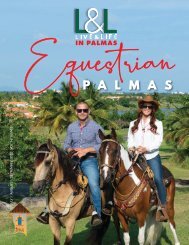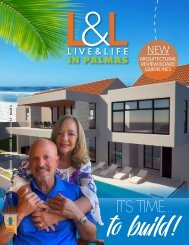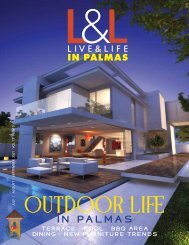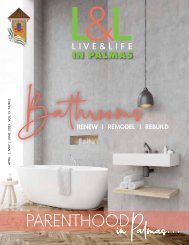REVISTA PALMAS 68 OCTUBRE 2022
Create successful ePaper yourself
Turn your PDF publications into a flip-book with our unique Google optimized e-Paper software.
<strong>2022</strong> SARGASSUM SEASON<br />
response & events<br />
By JA Quiñones, ESQ PHA Executive Director<br />
Sargassum accumulation negatively effects everyone in Palmas by<br />
making many of our beaches and large swaths of our coast difficult to<br />
use for several months of the year. Interior regions are also affected by<br />
the unfortunate smell emitted as sargassum dries in the sun. As large<br />
amounts of sargassum are continuing to reach our shores, the PHA has<br />
recently substantially increased its efforts to remove sargassum from<br />
our beaches and coastal areas and is continuing to explore ways to keep<br />
sargassum offshore.<br />
In the last 6 months, the PHA has:<br />
Conducted active Sargassum Collection at our coastal zone<br />
1shoreline, from Marbella to Shellcastle Beach, employing<br />
contracted services of a beach raker and tractor, hand collection<br />
and use of specialty equipment designed for our coastal<br />
zone conditions. The Slip Owners Association (SOA) has been<br />
employing a unique design of a floating conveyor belt and<br />
collection barge to clean the inner harbor from sargassum.<br />
2<br />
3<br />
4<br />
5<br />
On a routine basis we are in communication with our municipal,<br />
state and federal allies at the Commonwealth Department<br />
of Natural Resources, the Environmental Protection<br />
Agency, the Environmental Quality Board, Regional US Fish<br />
and Wildlife Service, NOAA (Area Mapping and GIS), and<br />
Army Corps of Engineering, among others, to help manage<br />
the sargassum situation.<br />
PHA has received the unconditional support, free of cost, of<br />
many Not-for-Profit Corporations, Non-Governmental Organizations,<br />
Research Institutes, and other field experts, such as<br />
Sea Grant Puerto Rico, Texas A&M University HARTE Research<br />
Institute, CARICOOS, and the University of Puerto Rico (Mayaguez,<br />
Rio Piedras and Humacao Campus).<br />
PHA and university researchers have established monitoring<br />
stations for water and air quality and will be working in the<br />
near future to install underwater aerators at the Palmas del<br />
Mar inner harbors (SOA), an installation that was delayed as<br />
prompted by the Army Corps of Engineers. Once complete,<br />
this installation should substantially clear up water at inner<br />
harbor..<br />
Collection areas include coastal zones (PHA), Barriers and<br />
surface collection (SOA), employing numerous collection<br />
methods. Challenges include constantly changing conditions<br />
including currents, rain, hurricane season, winds, sun,<br />
tides and other variables that are outside of our control.<br />
These challenges affect consistency and nature of the sand,<br />
as our Coastal Zone has two cycles of ebb/tide maintaining<br />
wet sand 24/7 at sargassum accumulation areas. Further, our<br />
permits are employed in a way that is monitored by state and<br />
federal agencies, in a way that such collection will not cause<br />
erosion damages to our fragile coastal zone, nor affect seasonal<br />
endangered species seeking safe refuge.<br />
Our efforts start with our Habitat Conservation Plan, a unique tool<br />
that has a Fish and Wildlife Section 7 Consultation to Municipal, State<br />
and Federal agencies, under the Endangered Species Act (ESA). PHA<br />
has the appropriate permits to reduce the impact of Sargassum within<br />
our coastal zones, and are actively employing numerous methos of<br />
collection, all in accordance with the Commonwealth of Puerto Rico<br />
Department of Natural Resources Guidelines (Published 2015). In addition,<br />
PHA under the leadership of HARTE Institute, participated within<br />
the <strong>2022</strong> Virtual Legal Considerations on the Removal of Sargassum<br />
from the Coasts of Puerto Rico, assisting local state and federal agencies<br />
to develop “an all approach” process for monitoring, collection, and<br />
disposal of sargassum. The current model used by Palmas del Mar community<br />
has spearheaded numerous efforts within Puerto Rico coastal<br />
areas, serving as a starting guide for state and federal environmental<br />
agencies as well.<br />
PHA has invested over $65,000.00 this season to collect and dispose<br />
sargassum from our coastal zone, and the Palmas Slipowners<br />
Association (SOA) at least $140,000.00 since the season started back<br />
in March <strong>2022</strong> [Differences in Costs Prompted by Specialized Equipment<br />
for Shore/Water Collection]. That amount could easily be double<br />
if we counted the volunteer hours from scientists, research students,<br />
national/international subject matter experts, and most importantly<br />
our community volunteer leaders who were engaged on this problem<br />
throughout the season and who are helping us with long term planning<br />
for years to come.<br />
Long term plans are being looked at with numerous experts, to<br />
include a Biodiesel generation site requiring fresh sargassum to be<br />
collected, but, additional permits from the Environmental Protection<br />
Agency are required as the floating sargassum is considered a biomass<br />
with potential endangered species using to feed and nest. The named<br />
all comprehensive plan is being put in place by our municipal, state<br />
and federal authorities, perhaps under the Stafford Act that will allow<br />
for added funds. In the interim, members of our PHA Board of Directors<br />
will be seeking additional funds and looking ahead to the upcoming<br />
season to prepare a more active response, with the assistance of private<br />
funds from residents [Endowments/Trusts/Etc.] and Non-for-Profit<br />
organizations.<br />
A succinct description of sargassum monitoring, collection and disposal<br />
efforts was provided, but, the best so far has been witnessing an<br />
unprecedented comradery within our Palmas del Mar Residential/Resort<br />
community, teaming up to make our Coastal Zone the most pristine<br />
and biodiverse location for our residents/tourists to enjoy. s<br />
[Clean up efforts photos, presentations, and ongoing legal documents will be posted at PHA website]











